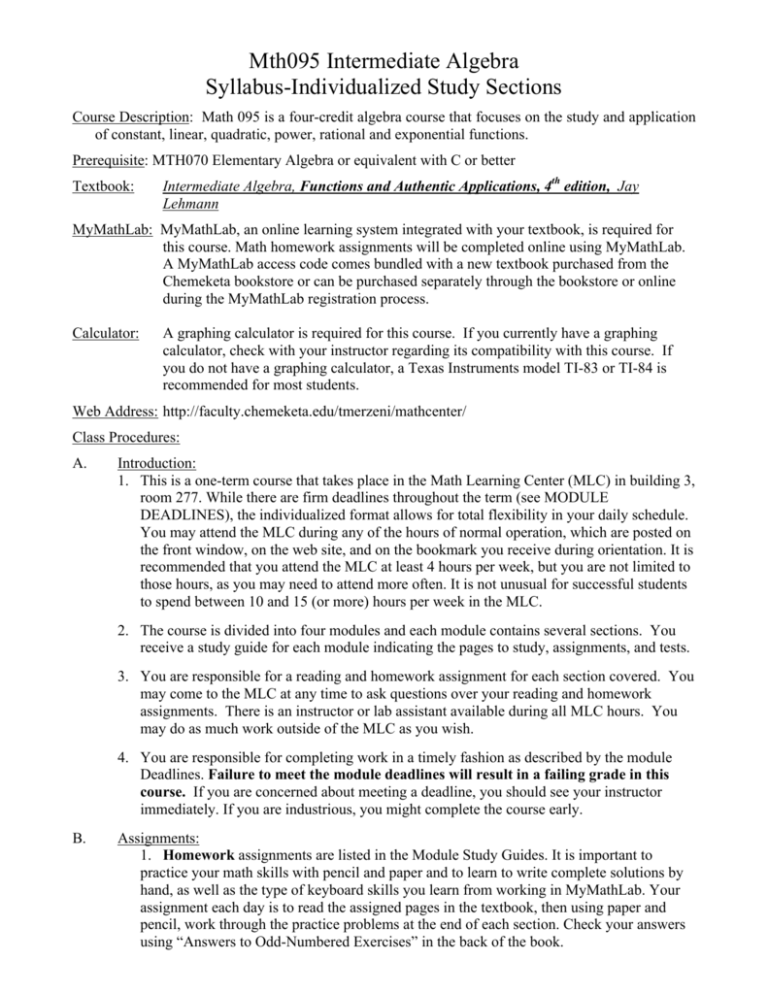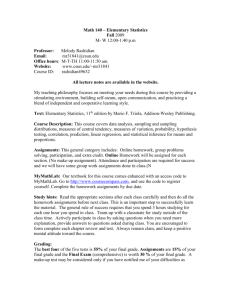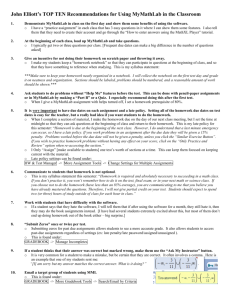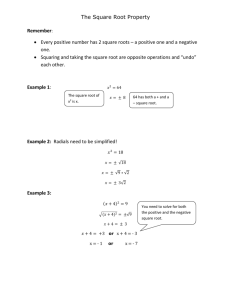Mth095 Intermediate Algebra Syllabus
advertisement

Mth095 Intermediate Algebra Syllabus-Individualized Study Sections Course Description: Math 095 is a four-credit algebra course that focuses on the study and application of constant, linear, quadratic, power, rational and exponential functions. Prerequisite: MTH070 Elementary Algebra or equivalent with C or better Textbook: Intermediate Algebra, Functions and Authentic Applications, 4th edition, Jay Lehmann MyMathLab: MyMathLab, an online learning system integrated with your textbook, is required for this course. Math homework assignments will be completed online using MyMathLab. A MyMathLab access code comes bundled with a new textbook purchased from the Chemeketa bookstore or can be purchased separately through the bookstore or online during the MyMathLab registration process. Calculator: A graphing calculator is required for this course. If you currently have a graphing calculator, check with your instructor regarding its compatibility with this course. If you do not have a graphing calculator, a Texas Instruments model TI-83 or TI-84 is recommended for most students. Web Address: http://faculty.chemeketa.edu/tmerzeni/mathcenter/ Class Procedures: A. Introduction: 1. This is a one-term course that takes place in the Math Learning Center (MLC) in building 3, room 277. While there are firm deadlines throughout the term (see MODULE DEADLINES), the individualized format allows for total flexibility in your daily schedule. You may attend the MLC during any of the hours of normal operation, which are posted on the front window, on the web site, and on the bookmark you receive during orientation. It is recommended that you attend the MLC at least 4 hours per week, but you are not limited to those hours, as you may need to attend more often. It is not unusual for successful students to spend between 10 and 15 (or more) hours per week in the MLC. 2. The course is divided into four modules and each module contains several sections. You receive a study guide for each module indicating the pages to study, assignments, and tests. 3. You are responsible for a reading and homework assignment for each section covered. You may come to the MLC at any time to ask questions over your reading and homework assignments. There is an instructor or lab assistant available during all MLC hours. You may do as much work outside of the MLC as you wish. 4. You are responsible for completing work in a timely fashion as described by the module Deadlines. Failure to meet the module deadlines will result in a failing grade in this course. If you are concerned about meeting a deadline, you should see your instructor immediately. If you are industrious, you might complete the course early. B. Assignments: 1. Homework assignments are listed in the Module Study Guides. It is important to practice your math skills with pencil and paper and to learn to write complete solutions by hand, as well as the type of keyboard skills you learn from working in MyMathLab. Your assignment each day is to read the assigned pages in the textbook, then using paper and pencil, work through the practice problems at the end of each section. Check your answers using “Answers to Odd-Numbered Exercises” in the back of the book. After correctly working through these problems, log into your online MyMathLab account and complete the corresponding assignment there. MyMathLab homework assignments are graded electronically and must each be completed at a 100% level, but you are allowed to practice as much as you choose. In addition to the practice problems in the book and the MyMathLab assignments, there are a few “Supplemental” assignments. You are directed to these assignments in the study guide. Assignments must be completed in the order they appear in the study guide, and no homework is accepted for a module until the previous module is completed. 2. After completing all the homework assignments for a module, pick up a Review assignment for that module. Review assignments are checked by one of the qualified staff behind the counter in the MLC. If you miss any problems on the review go back to the text and review the section containing that type of problem, then rework that problem. Bring the corrections, along with the original review paper, and have the review checked again. Continue this process until all problems are correct. If, after several attempts, you are still unable to get the correct answer on a problem, you may discuss your difficulties with an instructor but do not ask lab assistants for help on the review. Credit for the review is earned only when you get all the problems correct. To receive credit for the module review, all homework for that module must be completed and your review must be completed and corrected on or before the review deadline. Please notice that the review assignments are not sample tests. The review assignments are designed to get you started on your review for the test. Be sure to study the homework and the textbook readings for a more complete review. C. Tests: 1. There is a test for each module. You are allowed the use of a calculator and a formula sheet on all of the exams in this course. Each module test must be taken on or before the test deadline. If you miss a deadline you are not allowed to continue in the course and you must see your instructor immediately. If you complete a test and are not satisfied with the score you may retake it one time. Each retest must be completed on or before the retest deadline. You are not allowed to take a test and the retake on the same day, so try to take the module tests a few days before the deadline to allow time for a retake, if desired. Your grade is the average of the two test scores. You may be allowed to make up one missed exam during finals week if you make arrangements with your instructor in advance. Subsequent missed deadlines will result in a test score of zero. 2. A Final Exam is taken after you have completed all of the modules. The final exam must be taken to receive a passing grade in this course. Please see the due dates for the current term. D. Evaluation: 1. Homework Assignments Review Assignments Application Tests Final Exam Total TM/F’14/printed 12/27/2014 23@ 1 point 4@ 5 points 3@ 100 points 1@ 60 points 1@ 150 points 23 points 20 points 300 points 60 points 150 points 553 points 2. Final grades are determined using the following scale. Percentages are calculated out of the total points possible. A B C D 90 - 100% 80 - 89% 70 - 79% 60 - 69% F 0-59% IF incomplete grades are rarely given, see #3, below 3. Grades of Incomplete (IF) are rare, and given at your instructor’s discretion. Below is a list of some criteria that are considered: • you are missing one key element of the coursework, eg. all work is complete except the final exam • all modules were completed on or before the due dates throughout the term • you must be passing the course at a 70% level or above • you are spending enough time in class to show significant effort toward completion of the course • you have special accommodations through the disability services office E. Academic Honesty: If a student is caught cheating, the first offense will result in a score of zero on the test with no retake possible and the incident will be reported to the dean of students. A second offense will result in a failure grade (F) in the course and the incident will be reported to the dean. Learner Outcomes: Upon successful completion of the course, students should be able to: 1. Use mathematical problem solving techniques involving constant, linear quadratic, power, rational and exponential functions. 2. Create algebraic models of real situations using constant, linear, quadratic, power, rational and exponential functions. 3. Use inductive reasoning to develop mathematical conjectures involving constant, linear, quadratic, power, rational and exponential functions. Use deductive reasoning to verify conjectures and to apply mathematical theorems. 4. Make mathematical connections to, and solve problems from, other disciplines involving constant, linear, quadratic, power, rational and exponential functions. 5. Use oral and written skills to individually and collaboratively communicate about applications involving constant, linear, quadratic, power, rational and exponential functions. 6. Use appropriate technology to solve mathematical problems and to enhance mathematical thinking and understanding of constant, linear, quadratic, power, rational and exponential functions. Disability: If you have a documented disability that may impact your ability to succeed in this course, please contact Disability Services at 503-399-5192 (voice/TTY) or visit them in Building 2, room 109 on the Salem campus. They can help assess your educational needs and provide you with an action plan that includes recommendations on how we can best support you. Diversity: We are enriched by the diversity of our students, staff, and community. We welcome diverse perspectives and encourage the free exchange of ideas. Chemeketa Community College provides an environment that celebrates the freedom to learn and the freedom to teach. In that celebration of teaching and learning it is appropriate that individuals and groups be viewed with regard to their potential to contribute within the learning environment. Each has dignity and value. TM/F’14/printed 12/27/2014







